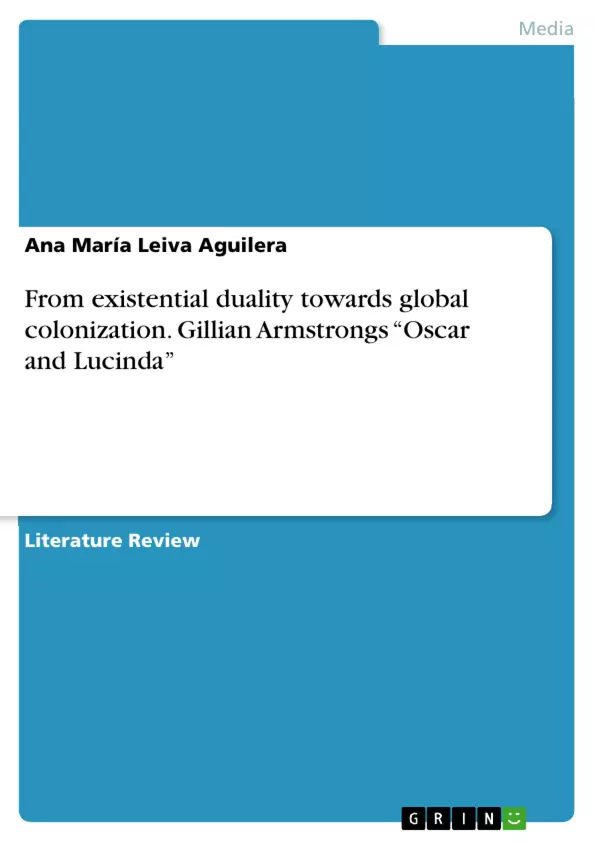This essay deals with the Film "Oscar and Lucinda" by Australian director Gillian Armstrong. The aim of the essay will be that of developing all the themes which underlie under the plot, by taking the two main characters as referents. Among these topics, we distinguish: struggles and religious ideologies, colonization, gambling, love passion, determinism and divine will, fight towards freedom and female rights. All this under the same prism of the Victorian Period in England.
The film Oscar and Lucinda, directed by the Australian Gillian Armstrong, is a cinematographic adaptation of the same named novel, by the Australian Peter Carey and written in 1988.
The story, narrated by one of the main character’s descendant, begins in South New Gales in 1848 and develops during post-colonialism of the Old British Empire in Australia which took place during the second half of the 19th century. It is a story of confronted religious confessions, love, game, adventure and colonization. All this crimped from the meeting and experiences of an Anglican priest and a rich heiress, to whom passion and love will link altogether.
Inhaltsverzeichnis (Table of Contents)
- Introduction
- Religious Diversification and the Clash of Ideologies
- Gambling and the Question of Divine Will
- Lucinda's Struggle for Freedom and Female Rights
- Colonialism, Imperialism, and the Australian Landscape
- The Glass Church and the Absurdity of Human Ambition
- Conclusion
Zielsetzung und Themenschwerpunkte (Objectives and Key Themes)
This essay explores the themes presented in Peter Carey's novel, "Oscar and Lucinda," through the lens of the Victorian era in England. It analyzes the contrasting characters of Oscar Hopkins, a devout Anglican priest, and Lucinda Leplastier, a wealthy and independent heiress, who both find themselves entangled in a world of gambling, religious conviction, and the complexities of colonization. The essay aims to shed light on the various struggles and ideologies that underpin the narrative, ultimately examining the interplay between faith, reason, and human agency within a historical context.
- Religious Diversification and Conflicting Ideologies
- The Role of Gambling and the Question of Free Will
- The Fight for Female Rights and Freedom
- The Complexities of Colonialism and British Imperialism
- The Significance of the Glass Church and Human Ambition
Zusammenfassung der Kapitel (Chapter Summaries)
The novel opens with the introduction of Oscar Hopkins, a young man torn between his father's strict religious beliefs and his own calling to Anglicanism. The story contrasts his deeply held faith with the world of gambling, a vice that consumes him despite his attempts to justify it through charity. Meanwhile, Lucinda Leplastier, a woman determined to break free from societal expectations, invests her inheritance in a glass factory, symbolizing her desire for independence and challenging traditional gender roles. As the narrative unfolds, Oscar's gambling addiction leads him to Australia, where he meets Lucinda, and their lives become intertwined.
The story further explores the complexities of colonialism and its impact on the Australian landscape, examining the clash between European civilization and indigenous culture. The characters confront the brutality of colonization and grapple with their own moral compasses amidst the injustices they witness. The central motif of building a glass church in the heart of the Australian outback serves as a metaphor for human ambition, fragility, and the pursuit of impossible dreams.
Schlüsselwörter (Keywords)
This novel examines key themes including religious ideologies, gambling, love and passion, colonialism, female rights, and the struggle for freedom. The story features characters who grapple with questions of faith, reason, and determinism, ultimately highlighting the complexities of human nature and the challenges faced by individuals in navigating a rapidly changing world.
Frequently Asked Questions
What is the film "Oscar and Lucinda" based on?
The film is a cinematographic adaptation of the 1988 novel of the same name by Australian author Peter Carey.
Who directed the film "Oscar and Lucinda"?
The film was directed by the Australian filmmaker Gillian Armstrong.
What is the historical setting of the story?
The story begins in South New Wales in 1848 and takes place during the post-colonial period of the British Empire in Australia in the late 19th century.
What are the central themes explored in the essay?
Key themes include religious diversification, gambling vs. divine will, colonialism, imperialism, and the struggle for female rights.
What does the "Glass Church" symbolize in the narrative?
The Glass Church serves as a metaphor for human ambition, the fragility of dreams, and the pursuit of the seemingly impossible.
How are the characters of Oscar and Lucinda contrasted?
Oscar is a devout Anglican priest struggling with a gambling addiction, while Lucinda is a wealthy heiress fighting for independence and defying Victorian gender roles.
- Citation du texte
- Grado en Estudios Ingleses Ana María Leiva Aguilera (Auteur), 2015, From existential duality towards global colonization. Gillian Armstrongs “Oscar and Lucinda”, Munich, GRIN Verlag, https://www.grin.com/document/308942



